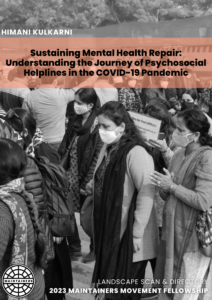“SUSTAINING MENTAL HEALTH REPAIR: Understanding the Journey of Psychosocial Helplines in the Covid-19 Pandemic” by Himani Kulkarni
You can download Himani’s Landscape Scan here.
“Individuals dealing with depression, anxiety disorders, and suicidal thoughts sought assistance, emphasizing the critical role helplines played in providing support for complex and deeply rooted mental health challenge (….) some callers sought solace in a friendly voice, highlighting the varied needs of those reaching out for support”
– Himani Kulkarni, 2023 Fellow in the “Maintaining Public Health” Pathway
Summary
This report provides a comprehensive overview of the impact of the COVID-19 pandemic on mental health and highlights commendable initiatives by mental health organizations in India. Key initiatives are laid out in a detailed repository of helplines, including “Project Mumbai, e iCALL, MannTalks, HelloSwasti, Fortis Helpline, KIRAN, and Tele-MANAS. It also serves to recognize the link between mental health and societal well-being, while honoring the essential labor that brings these efforts to life.
Insights
- Although the COVID-19 pandemic is usually framed within the parameters of a medical health emergency, it is important to acknowledge how the COVID-19 pandemic has affected and exacerbated mental health issues.
- In the case of a crisis response, it is possible to run mental health helplines with the use of trained volunteers, it can serve as a collective effort to reduce stigma on mental health challenges and create cultures of cooperativism. However, it is also important to create networks of professional mental health experts, especially to tend to those in a crisis that already have underlying mental health conditions.
- The helplines addressed a mix of issues, spanning from pandemic-related stress, anxiety, financial worries, and pre-existing mental health conditions. Other social issues, such as stress related to police brutality, were also topics discussed through the helplines.
- It is crucial to evaluate and research mental health initiatives while they are ongoing, as they are dynamic and pick up issues very specific to the historic moment they develop in. This knowledge is important in order to design future iterations of these services, as well as in the design of training modules for other helpline operators.
For more of Himani’s work, check out her Maintainers profile.
Preferred citation:
Kulkarni, Himani.
(2024, January 30). "SUSTAINING MENTAL HEALTH REPAIR: Understanding the Journey of Psychosocial Helplines in the Covid-19 Pandemic". The Maintainers. https://themaintainers.org/sustaining-mental-health-repair/
